-
 Bitcoin
Bitcoin $87,772.6996
0.99% -
 Ethereum
Ethereum $1,570.5330
-2.49% -
 Tether USDt
Tether USDt $1.0000
0.01% -
 XRP
XRP $2.0836
-1.10% -
 BNB
BNB $599.1765
0.07% -
 Solana
Solana $138.0201
-2.11% -
 USDC
USDC $0.9999
0.01% -
 Dogecoin
Dogecoin $0.1599
0.63% -
 TRON
TRON $0.2467
0.31% -
 Cardano
Cardano $0.6233
-1.67% -
 Chainlink
Chainlink $13.1154
-2.78% -
 UNUS SED LEO
UNUS SED LEO $9.1017
-1.66% -
 Avalanche
Avalanche $19.7493
-1.09% -
 Stellar
Stellar $0.2496
0.02% -
 Toncoin
Toncoin $2.9084
-3.65% -
 Shiba Inu
Shiba Inu $0.0...01230
-2.09% -
 Sui
Sui $2.2248
2.27% -
 Hedera
Hedera $0.1694
-0.70% -
 Bitcoin Cash
Bitcoin Cash $342.3982
0.49% -
 Hyperliquid
Hyperliquid $18.1794
-0.12% -
 Litecoin
Litecoin $78.6773
-0.19% -
 Polkadot
Polkadot $3.7586
-4.30% -
 Dai
Dai $0.9998
-0.02% -
 Bitget Token
Bitget Token $4.4381
-1.01% -
 Ethena USDe
Ethena USDe $0.9992
0.01% -
 Pi
Pi $0.6309
-1.94% -
 Monero
Monero $214.9808
-0.07% -
 Uniswap
Uniswap $5.2523
-2.33% -
 Pepe
Pepe $0.0...07838
1.42% -
 OKB
OKB $50.7171
-0.70%
How does blockchain game development achieve decentralized game governance?
Blockchain game development uses smart contracts, token-based models, and DAOs to enable decentralized governance, empowering players to influence game evolution.
Apr 20, 2025 at 12:14 am

Blockchain game development has revolutionized the gaming industry by introducing decentralized game governance, which allows players to have a more significant say in the development and management of the games they play. Decentralized governance in blockchain games is achieved through various mechanisms that empower the community and ensure that the game evolves in a way that benefits all stakeholders. This article explores the key aspects of how blockchain game development achieves decentralized game governance.
Smart Contracts and Autonomous Governance
One of the core elements of decentralized game governance is the use of smart contracts. Smart contracts are self-executing contracts with the terms of the agreement directly written into code. In the context of blockchain games, smart contracts automate many aspects of game management, including rule enforcement, asset distribution, and even voting mechanisms.
- Rule Enforcement: Smart contracts can enforce the rules of the game without the need for a central authority. For example, if a player attempts to make a move that violates the game's rules, the smart contract will automatically prevent this action.
- Asset Distribution: In many blockchain games, in-game assets are represented as non-fungible tokens (NFTs). Smart contracts manage the creation, ownership, and transfer of these assets, ensuring that they are distributed fairly and transparently.
- Voting Mechanisms: Smart contracts can also facilitate voting processes within the game community. Players can vote on proposed changes to the game, such as new features or modifications to existing rules, and the smart contract will execute these changes based on the community's consensus.
By leveraging smart contracts, blockchain games can achieve a high level of autonomy, reducing the need for centralized control and allowing the community to govern the game directly.
Token-Based Governance Models
Another critical aspect of decentralized game governance is the use of token-based governance models. In these models, players hold tokens that represent their stake in the game and their voting power. The more tokens a player holds, the more influence they have over the game's direction.
- Token Distribution: Tokens are typically distributed to players through various means, such as purchasing them with real money, earning them through gameplay, or receiving them as rewards for contributing to the game's development.
- Voting Power: Players can use their tokens to vote on proposals that affect the game. These proposals can range from minor changes, such as adjusting the difficulty of a level, to major decisions, such as adding new game modes or altering the game's economy.
- Incentive Structures: To encourage active participation in governance, many blockchain games implement incentive structures that reward players for voting and contributing to the game's development. These rewards can include additional tokens, exclusive in-game items, or other benefits.
Token-based governance models empower players by giving them a direct stake in the game's success and allowing them to influence its development in meaningful ways.
Decentralized Autonomous Organizations (DAOs)
Decentralized Autonomous Organizations (DAOs) are another powerful tool for achieving decentralized game governance. DAOs are organizations that operate on blockchain technology and are governed by smart contracts and the collective decisions of their members.
- DAO Formation: In the context of blockchain games, a DAO can be formed by the game's community to manage various aspects of the game, such as its treasury, development roadmap, and community initiatives.
- Decision-Making: Members of the DAO can propose and vote on decisions that affect the game. These decisions can include funding new development projects, allocating resources to different parts of the game, or even hiring new developers.
- Transparency and Accountability: DAOs operate on the blockchain, which means that all transactions and decisions are recorded on a public ledger. This transparency ensures that the governance process is accountable to the community and that all members can see how decisions are made and resources are allocated.
By utilizing DAOs, blockchain games can create a robust and transparent governance structure that is controlled by the community rather than a central authority.
Community-Driven Development
Community-driven development is a key component of decentralized game governance. In traditional game development, decisions are often made by a small team of developers and executives. In contrast, blockchain games empower the community to drive the game's development through various mechanisms.
- Player Feedback: Blockchain games often have built-in mechanisms for collecting and acting on player feedback. This can include in-game surveys, forums, and social media channels where players can voice their opinions and suggest improvements.
- Open Development: Many blockchain games adopt an open development model, where the game's codebase is publicly accessible, and players can contribute to its development. This can include submitting bug fixes, proposing new features, or even developing new content for the game.
- Community Funding: Some blockchain games allow the community to fund new development projects through mechanisms such as crowdfunding or token sales. This ensures that the game's development is aligned with the community's interests and that resources are allocated to projects that have broad support.
By involving the community in the development process, blockchain games can create a more inclusive and responsive development environment that reflects the needs and desires of its players.
Challenges and Solutions
While decentralized game governance offers many benefits, it also presents several challenges that must be addressed to ensure its success.
- Scalability: One of the main challenges of decentralized governance is scalability. As the number of players and the complexity of the game increase, it can become difficult to manage the governance process efficiently. To address this, many blockchain games implement scalable voting mechanisms and use off-chain solutions to handle some aspects of governance.
- Security: Ensuring the security of the governance process is crucial. Smart contracts and DAOs must be designed to prevent malicious actors from manipulating the system. This can be achieved through rigorous testing, audits, and the use of secure coding practices.
- Participation: Encouraging active participation in governance can be challenging, especially in large communities. To address this, many blockchain games implement incentive structures that reward players for participating in governance and contributing to the game's development.
By addressing these challenges, blockchain games can create a robust and effective decentralized governance system that empowers the community and ensures the game's long-term success.
Frequently Asked Questions
Q: How do smart contracts ensure fairness in blockchain games?
A: Smart contracts ensure fairness in blockchain games by automating rule enforcement and asset distribution. They execute the game's rules without bias, ensuring that all players are treated equally. Additionally, smart contracts manage the creation and transfer of in-game assets, such as NFTs, in a transparent and verifiable manner, preventing any manipulation or unfair advantage.
Q: Can players in a blockchain game influence the game's economy?
A: Yes, players in a blockchain game can influence the game's economy through token-based governance models. By holding tokens, players can vote on proposals that affect the game's economy, such as adjusting the supply of in-game currency, setting transaction fees, or implementing new economic features. This allows the community to shape the game's economic policies in a way that benefits all players.
Q: What role do DAOs play in managing a game's treasury?
A: DAOs play a crucial role in managing a game's treasury by allowing the community to collectively decide how resources are allocated. Members of the DAO can propose and vote on how to use the treasury funds, such as funding new development projects, rewarding contributors, or investing in marketing and community initiatives. This ensures that the game's financial resources are managed transparently and in line with the community's priorities.
Q: How can players contribute to the development of a blockchain game?
A: Players can contribute to the development of a blockchain game in several ways. They can provide feedback through in-game surveys and community forums, contribute to the game's codebase if it is open-source, and participate in community funding initiatives to support new development projects. Additionally, players can vote on proposed changes to the game, ensuring that the development process is aligned with the community's interests.
Disclaimer:info@kdj.com
The information provided is not trading advice. kdj.com does not assume any responsibility for any investments made based on the information provided in this article. Cryptocurrencies are highly volatile and it is highly recommended that you invest with caution after thorough research!
If you believe that the content used on this website infringes your copyright, please contact us immediately (info@kdj.com) and we will delete it promptly.
- The Next 100x Meme Coin Isn't Even Listed Yet: Trolling the Cat Market
- 2025-04-22 08:40:13
- Pepe Coin (PEPE) Price Prediction: Will the Memecoin Breakout?
- 2025-04-22 08:40:13
- SUI Could Rally 28%, AVAX Bulls Take Control—But Web3 ai's AI Tools Are Built to Outlast Them Both
- 2025-04-22 08:35:13
- Tron (TRX) Emerges as the Top Stablecoin Destination, Bringing in $623 Million
- 2025-04-22 08:35:13
- Apart from cryptocurrencies, NFTs are another popular market
- 2025-04-22 08:30:12
- Top 10 Trending Cryptos on DEXTools in April 2025
- 2025-04-22 08:30:12
Related knowledge
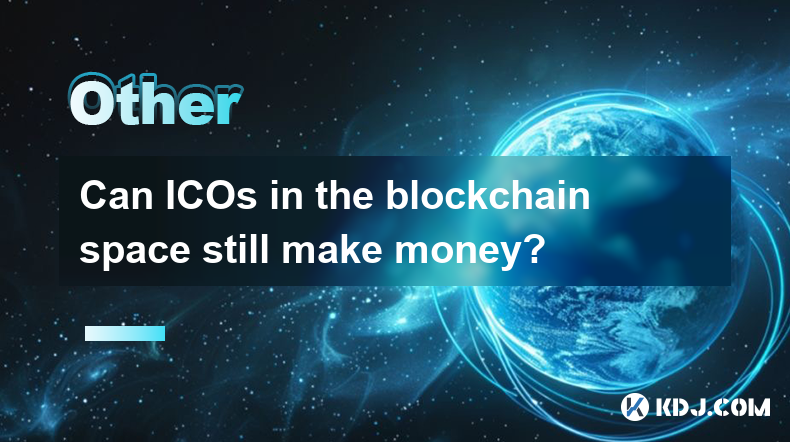
Can ICOs in the blockchain space still make money?
Apr 17,2025 at 08:29pm
The landscape of Initial Coin Offerings (ICOs) in the blockchain space has evolved significantly since their peak in 2017 and 2018. Despite the increased regulatory scrutiny and the rise of alternative fundraising methods like Security Token Offerings (STOs) and Initial Exchange Offerings (IEOs), ICOs can still be a viable way to raise funds and generat...
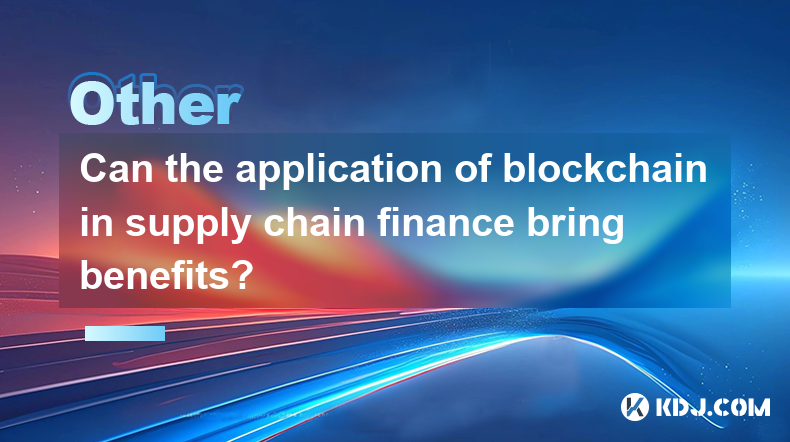
Can the application of blockchain in supply chain finance bring benefits?
Apr 15,2025 at 04:00pm
Can the application of blockchain in supply chain finance bring benefits? The integration of blockchain technology into supply chain finance has garnered significant attention in the cryptocurrency and financial sectors. This article explores how blockchain can potentially revolutionize supply chain finance, detailing its benefits and providing a compre...

Does the ranking of Chinese blockchain apps include cross-chain applications?
Apr 14,2025 at 04:00pm
The ranking of Chinese blockchain apps is a comprehensive evaluation that takes into account various aspects such as user base, transaction volume, and technological innovation. A pertinent question arises regarding whether these rankings include cross-chain applications. Cross-chain applications, which allow different blockchain networks to interact an...
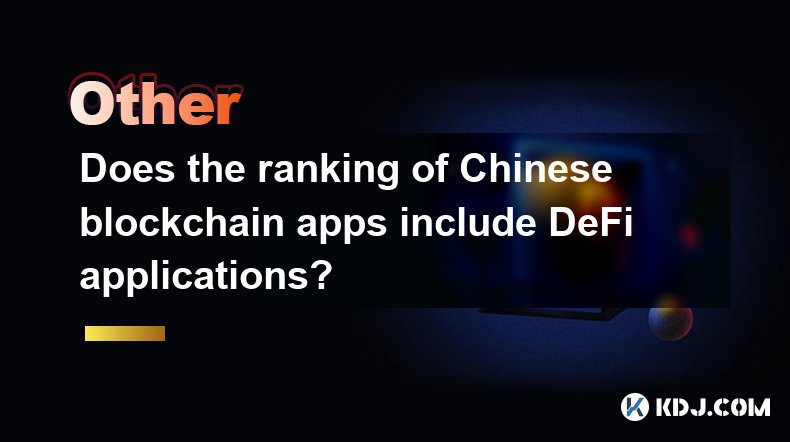
Does the ranking of Chinese blockchain apps include DeFi applications?
Apr 15,2025 at 06:57am
The ranking of Chinese blockchain apps is a comprehensive list that showcases the most popular and influential applications within the cryptocurrency ecosystem. One question that often arises is whether these rankings include DeFi applications. To answer this, we need to delve into the specifics of how these rankings are compiled and what types of appli...
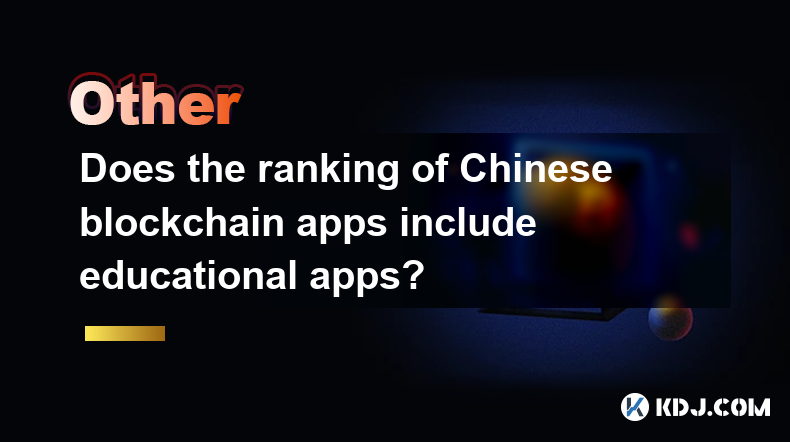
Does the ranking of Chinese blockchain apps include educational apps?
Apr 16,2025 at 03:35am
The ranking of Chinese blockchain apps often includes a variety of categories, from finance and gaming to social networking and beyond. One question that frequently arises is whether these rankings include educational apps. To address this, we need to delve into the specifics of how blockchain apps are categorized and ranked in China, and whether educat...
Does the ranking of Chinese blockchain apps include enterprise-level applications?
Apr 15,2025 at 06:42am
The ranking of Chinese blockchain apps often includes a variety of applications, ranging from consumer-focused to enterprise-level solutions. Understanding the scope and criteria for these rankings is essential to determine if enterprise-level applications are included. This article delves into the specifics of how Chinese blockchain app rankings are co...

Can ICOs in the blockchain space still make money?
Apr 17,2025 at 08:29pm
The landscape of Initial Coin Offerings (ICOs) in the blockchain space has evolved significantly since their peak in 2017 and 2018. Despite the increased regulatory scrutiny and the rise of alternative fundraising methods like Security Token Offerings (STOs) and Initial Exchange Offerings (IEOs), ICOs can still be a viable way to raise funds and generat...

Can the application of blockchain in supply chain finance bring benefits?
Apr 15,2025 at 04:00pm
Can the application of blockchain in supply chain finance bring benefits? The integration of blockchain technology into supply chain finance has garnered significant attention in the cryptocurrency and financial sectors. This article explores how blockchain can potentially revolutionize supply chain finance, detailing its benefits and providing a compre...

Does the ranking of Chinese blockchain apps include cross-chain applications?
Apr 14,2025 at 04:00pm
The ranking of Chinese blockchain apps is a comprehensive evaluation that takes into account various aspects such as user base, transaction volume, and technological innovation. A pertinent question arises regarding whether these rankings include cross-chain applications. Cross-chain applications, which allow different blockchain networks to interact an...

Does the ranking of Chinese blockchain apps include DeFi applications?
Apr 15,2025 at 06:57am
The ranking of Chinese blockchain apps is a comprehensive list that showcases the most popular and influential applications within the cryptocurrency ecosystem. One question that often arises is whether these rankings include DeFi applications. To answer this, we need to delve into the specifics of how these rankings are compiled and what types of appli...

Does the ranking of Chinese blockchain apps include educational apps?
Apr 16,2025 at 03:35am
The ranking of Chinese blockchain apps often includes a variety of categories, from finance and gaming to social networking and beyond. One question that frequently arises is whether these rankings include educational apps. To address this, we need to delve into the specifics of how blockchain apps are categorized and ranked in China, and whether educat...

Does the ranking of Chinese blockchain apps include enterprise-level applications?
Apr 15,2025 at 06:42am
The ranking of Chinese blockchain apps often includes a variety of applications, ranging from consumer-focused to enterprise-level solutions. Understanding the scope and criteria for these rankings is essential to determine if enterprise-level applications are included. This article delves into the specifics of how Chinese blockchain app rankings are co...
See all articles






















































































